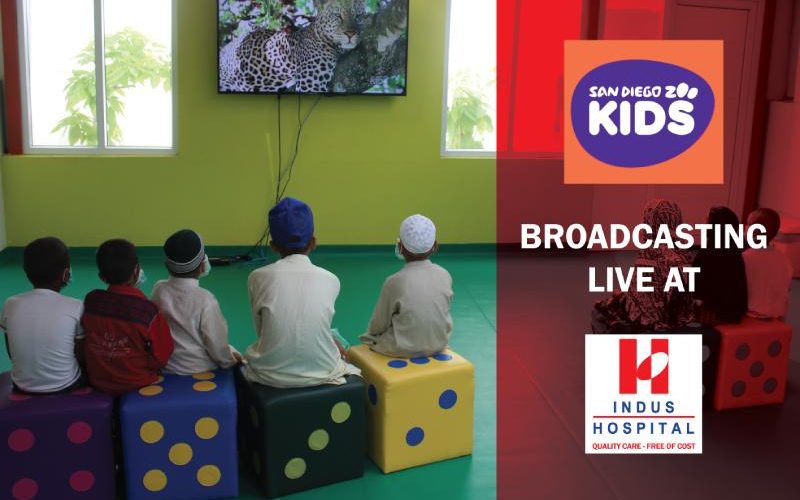SAN DIEGO ZOO KIDS TV BEGINS BROADCASTING AT INDUS HOSPITAL IN KARACHI, PAKISTAN
San Diego Zoo Kids, a closed-circuit television adventure channel, has begun broadcasting at The Indus Hospital in Karachi, Pakistan. San Diego Zoo Kids is an innovative television channel with programs produced primarily for medical facilities that serve pediatric patients and their families. San Diego Zoo Kids’ programming provides family friendly, animal-oriented stories that are both entertaining and educational.
“We are happy and excited to enter into a partnership with San Diego Zoo Global for offering its services to our pediatric patients,” said Dr. M. Shamvil Ashraf, executive director, medical services, Indus Health Network. “We hope that the programs will help children in distracting them from their pain. As these children have chronic illnesses and are immune-compromised, they aren’t allowed to go out or keep pets; so the channel will help them, by watching educational and entertaining programs. It also helps caregivers and families to cope with the stress.”
The San Diego Zoo Kids channel offers up-close video encounters with animals, stories about caring for animals, quizzes about animals and habitats, and a wide variety of short video vignettes hosted by San Diego Zoo Global ambassador Rick Schwartz and San Diego Zoo Kids hosts Olivia Degn and Michelle Myers. Viewers can see best-of videos from the San Diego Zoo’s Elephant Cam and other online cameras, as well as content from other zoos across the world, including Lone Pine Koala Sanctuary, Singapore Zoo and Wellington Zoo.
“We continue to be humbled by the healing properties of San Diego Zoo Kids,” said Debra Erickson, director of communications, San Diego Zoo Global. “Parents and caregivers share that the channel, which has no commercials or inappropriate content, not only calms children but makes them happy.”
San Diego Zoo Kids channel has been made possible by businessman and philanthropist T. Denny Sanford. It debuted in 2013 at Rady Children’s Hospital in San Diego, and since then, the channel has been installed in 252 children’s hospitals and Ronald McDonald Houses in 42 states across the U.S. and the District of Columbia, and in facilities in Mexico, Canada, Australia, New Zealand, Singapore, Pakistan, Qatar, Curaçao and South Africa.
About Indus Hospital Network (IHN)
The Indus Hospital is the predecessor of the Indus Health Network. The network is one-of-a-kind initiative in Pakistan, to provide premium quality healthcare to all its patients free of cost, without any discrimination. With its flagship operation in Korangi, Karachi and campuses across the country, IHN has now evolved into a countrywide healthcare network of hospitals, primary care clinics, container and boat clinics, regional blood centers, and physical rehabilitation centers. The network solely relies on public donations, and corporate and government grants.
San Diego Zoo Kids
San Diego Zoo Kids reaches out to millions of children each year who might not otherwise be able to experience the wonders of animals, plants and their habitats, with the goal of making nature accessible to children everywhere. As part of San Diego Zoo Global, an international nonprofit conservation organization that works to save plants and animals worldwide, San Diego Zoo Kids seeks to fight extinction by raising awareness, building respect and igniting a passion for wildlife and conservation among younger audiences. The San Diego Zoo Kids website (kids.sandiegozoo.org) provides a learning experience about animals, habitats and conservation for children anywhere. San Diego Zoo Kids provides free and discounted education programs in San Diego that meet LEAD standards for science curriculum and provides teacher training (kids.sandiegozoo.org/grownups). The San Diego Zoo Kids channel (sandiegozoo.org/kidsnetwork) broadcasts television programming in more than 250 children’s hospitals and Ronald McDonald Houses around the world, providing joy, comfort, laughter and learning to children and their families who are experiencing challenging times. To learn more, visit the links above or connect with us on Instagram, Facebook and YouTube.




